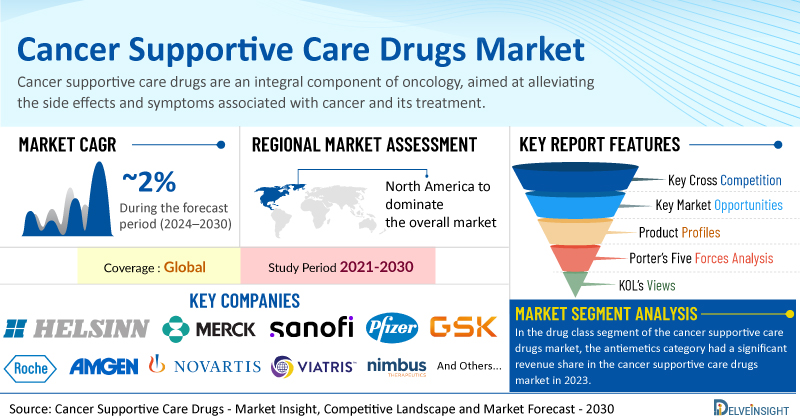New York, USA, Aug. 01, 2024 (GLOBE NEWSWIRE) -- Global Cancer Supportive Care Drugs Market to Cross 17 Billion Mark by 2030| DelveInsight
The global increase in cancer cases is the main factor driving the demand for supportive care drugs. Additionally, the growing incidence of adverse effects from cancer treatments like chemotherapy, which necessitates the use of supportive care drugs, and government support for cancer treatment are key factors contributing to the expected growth of the cancer supportive care drugs market from 2024 to 2030.
DelveInsight’s Cancer Supportive Care Drugs Market Insights report provides the current and forecast market analysis, individual leading cancer supportive care drugs companies’ market shares, challenges, cancer supportive care drugs market drivers, barriers, trends, and key market cancer supportive care drugs companies in the market.
Key Takeaways from the Cancer Supportive Care Drugs Market Report
- As per DelveInsight estimates, North America is anticipated to dominate the global cancer supportive care drugs market during the forecast period.
- In the drug class segment of the cancer supportive care drugs market, the antiemetics category had a significant revenue share in the cancer supportive care drugs market in 2023.
- Notable cancer supportive care drugs companies such as Helsinn Healthcare SA, Merck & Co., Inc., Sanofi, Pfizer Inc., GSK plc, F. Hoffmann-La Roche Ltd., Amgen Inc., Novartis AG, Viatris Inc., Nimbus Therapeutics, Gilead Sciences, Inc., Eli Lilly and Company, Moderna, Inc., AbbVie Inc., Amgen Inc., Regeneron Pharmaceuticals Inc., Takeda Pharmaceutical Company Limited, Otsuka Holdings Co., Ltd., Affimed GmbH, Bristol-Myers Squibb Company, and several others, are currently operating in the cancer supportive care drugs market.
- In May 2023, RedHill Biopharma Ltd. Announced that it has patents in both the European Union and the United States for RHB-102 (BEKINDA). RHB-102 I developed for the treatment of chemotherapy and radiotherapy-induced nausea and vomiting.
- In January 2023, Helsinn Healthcare SA and Immedica Pharma AB announced that both companies have entered an exclusive long-term agreement for the commercialization of two cancer supportive care products which is Akynzeo and Aloxi, in core European markets, aimed at preventing chemotherapy-induced nausea and vomiting (CINV).
To read more about the latest highlights related to the cancer supportive care drugs market, get a snapshot of the key highlights entailed in the Global Cancer Supportive Care Drugs Market Report
Cancer Supportive Care Drugs Overview
Cancer supportive care drugs are an integral component of oncology, aimed at alleviating the side effects and symptoms associated with cancer and its treatment. These medications help manage pain, nausea, fatigue, and other debilitating effects that can arise from chemotherapy, radiation, or the cancer itself. Pain management drugs, such as opioids and non-opioid analgesics, are crucial for maintaining the quality of life in cancer patients. Antiemetics, like ondansetron and metoclopramide, are used to control nausea and vomiting, common side effects of many cancer treatments. Additionally, drugs like erythropoietin-stimulating agents (ESAs) help combat anemia, which is frequently seen in patients undergoing chemotherapy.
Beyond symptom management, supportive care drugs also focus on preventing and treating infections, a significant risk for cancer patients due to their often compromised immune systems. Antibiotics, antifungals, and antiviral medications play a key role in this aspect of care. Growth factors, such as granulocyte colony-stimulating factors (G-CSF), are used to boost white blood cell counts, reducing the risk of infection. Bisphosphonates and denosumab are prescribed to strengthen bones and prevent fractures in patients with bone metastases. By addressing these varied needs, supportive care drugs enable patients to better tolerate their cancer treatments, ultimately improving their overall outcomes and well-being.

Cancer Supportive Care Drugs Market Insights
North America held the largest share of the cancer supportive care drugs market in 2023. This dominance is attributed to the increasing number of cancer cases and the growing elderly population in the region.
The American Cancer Society's Cancer Facts & Figures 2024 reports that nearly 2 million new cancer cases are anticipated in the United States in 2024, up from 1.9 million in 2023. Additionally, the National Cancer Institute's data from May 2024 reveals that there were approximately 18.1 million cancer survivors in the U.S. as of January 2022, representing about 5.4% of the population. Projections indicate that the number of cancer survivors will rise by 24.4%, reaching 22.5 million by 2032 and 26 million by 2040.
Furthermore, the Population Reference Bureau stated in January 2024 that the American population aged 65 and above is expected to increase significantly, from 58 million in 2022 to 82 million by 2050, a 47% rise. The proportion of this age group within the total population is also forecasted to grow from 17% to 23%. Therefore, the surge in cancer cases and the expanding geriatric population are major factors driving the growth of the cancer supportive care drugs market in North America.
To know more about why North America is leading the market growth in the cancer supportive care drugs market, get a snapshot of the Cancer Supportive Care Drugs Market Outlook
Cancer Supportive Care Drugs Market Dynamics
The cancer supportive care drugs market is a critical component of the broader oncology pharmaceuticals landscape. A significant driver of the market is the increasing prevalence of cancer globally. As the number of cancer diagnoses rises, so does the demand for supportive care treatments. This is compounded by advancements in cancer therapies that, while more effective at targeting tumors, often come with severe side effects that require management. Additionally, an aging global population contributes to this trend, as the incidence of cancer is higher among older adults.
Another key dynamic in the cancer supportive care drugs market is the ongoing innovation and development of new therapies. Pharmaceutical companies are investing heavily in research and development to create more effective and less toxic supportive care drugs. For instance, biosimilars are becoming increasingly important as they offer cost-effective alternatives to existing biologic treatments, potentially increasing access to necessary medications for more patients.
Regulatory policies and reimbursement frameworks also play a crucial role in shaping the market. Supportive care drugs must navigate rigorous approval processes to demonstrate their efficacy and safety. Moreover, the cost of these drugs and the extent to which they are covered by insurance can significantly impact their market penetration. Countries with robust healthcare systems and favorable reimbursement policies typically see higher adoption rates of supportive care treatments.
Lastly, patient awareness and education are pivotal in the growth of the cancer supportive care drugs market. As patients become more informed about the options available to manage treatment side effects, demand for these drugs increases. Healthcare providers and patient advocacy groups are crucial in disseminating information and supporting patients in their treatment journeys, further driving market dynamics.
Overall, the cancer supportive care drugs market is characterized by a complex interplay of factors including rising cancer prevalence, innovation in drug development, regulatory landscapes, and patient education, all of which contribute to its growth and evolution.
Get a sneak peek at the cancer supportive care drugs market dynamics @ Cancer Supportive Care Drugs Market Dynamics Analysis
| Report Metrics | Details |
| Coverage | Global |
| Study Period | 2021–2030 |
| Cancer Supportive Care Drugs Market CAGR | ~2% |
| Cancer Supportive Care Drugs Market Size by 2030 | USD 16.8 Billion |
| Key Cancer Supportive Care Drugs Companies | Helsinn Healthcare SA, Merck & Co., Inc., Sanofi, Pfizer Inc., GSK plc, F. Hoffmann-La Roche Ltd., Amgen Inc., Novartis AG, Viatris Inc., Nimbus Therapeutics, Gilead Sciences, Inc., Eli Lilly and Company, Moderna, Inc., AbbVie Inc., Amgen Inc., Regeneron Pharmaceuticals Inc., Takeda Pharmaceutical Company Limited, Otsuka Holdings Co., Ltd., Affimed GmbH, Bristol-Myers Squibb Company, among others |
Cancer Supportive Care Drugs Market Assessment
- Cancer Supportive Care Drugs Market Segmentation
- Cancer Supportive Care Drugs Market Segmentation By Drug Class: Antiemetics, Antidiarrheals, Anti-Infective Drugs, Granulocyte Colony Stimulating Factors (G-CSF), Antacids, Antimetabolites, Cytoprotectants, Nsaids, Opioid Analgesics, Others
- Cancer Supportive Care Drugs Market Segmentation By Application: Breast Cancer, Blood Cancer, Prostate Cancer, Lung Cancer, and Others
- Cancer Supportive Care Drugs Market Segmentation By Distribution Channel: Hospital Pharmacy, Retail Pharmacy, Online Pharmacy
- Cancer Supportive Care Drugs Market Segmentation By Geography: North America, Europe, Asia-Pacific, and Rest of World
- Porter’s Five Forces Analysis, Product Profiles, Case Studies, KOL’s Views, Analyst’s View
Which MedTech key players in the cancer supportive care drugs market are set to emerge as the trendsetter explore @ Cancer Supportive Care Drugs Companies
Table of Contents
| 1 | Report Introduction |
| 2 | Executive summary |
| 3 | Regulatory and Patent Analysis |
| 4 | Key Factors Analysis |
| 5 | Porter’s Five Forces Analysis |
| 6 | Cancer Supportive Care Drugs Market Layout |
| 7 | Global Company Share Analysis – Key 3-5 Companies |
| 8 | Cancer Supportive Care Drugs Market Company and Product Profiles |
| 9 | Project Approach |
| 10 | About DelveInsight |
Interested in knowing the cancer supportive care drugs market by 2030? Click to get a snapshot of the Cancer Supportive Care Drugs Market Trends
Related Reports
Metastatic Prostate Cancer Market
Metastatic Prostate Cancer Market Insight, Epidemiology, and Market Forecast – 2032 report delivers an in-depth understanding of the market trends, market drivers, market barriers, and key metastatic prostate cancer companies, including AstraZeneca, Merck Sharp & Dohme, Hinova Pharmaceuticals, Pfizer, Astellas Pharma, Modra Pharmaceuticals, AB Science, Eli Lilly and Company, Zr Pharma & GmbH, Bristol-Myers Squibb, Ipsen, Exelixis, Takeda, Janssen Research & Development, Tesaro, Lantheus Holdings, Kintor Pharmaceutical, MacroGenics, Daiichi Sankyo, Madison Vaccines, Novartis, Point Biopharma, Xencor, Essa Pharma, Telix International, Bayer, Arvinas, among others.
Metastatic Castration-Resistant Prostate Cancer Market
Metastatic Castration-Resistant Prostate Cancer Market Insights, Epidemiology, and Market Forecast – 2032 report delivers an in-depth understanding of the disease, historical and forecasted epidemiology, market share of the individual therapies, and key metastatic castration-resistant prostate cancer companies including AstraZeneca, Arvinas, Madison Vaccines, Phosplatin Therapeutics, Hinova Pharmaceuticals, Bristol Myers Squibb, Merck, MacroGenics, Daiichi Sankyo, Seagen, Taiho Pharmaceutical, Modra Pharmaceuticals, Xencor, Point Biopharma, Lantheus Holdings, Zenith Epigenetics, Essa Pharma, Telix Pharmaceuticals, Kintor Pharmaceutical, AB Science, Eli Lilly and Company, Exelixis among others.
Metastatic HER2-Positive Breast Cancer Market
Metastatic HER2-Positive Breast Cancer Market Insights, Epidemiology, and Market Forecast – 2032 report deliver an in-depth understanding of the disease, historical and forecasted epidemiology, market share of the individual therapies, and key metastatic HER2-positive breast cancer companies including Byondis, Roche, Ambrx, Zymeworks, Jazz Pharmaceuticals, Pfizer, among others.
Metastatic HR+/HER2− Breast Cancer Market
Metastatic HR+/HER2− Breast Cancer Market Insights, Epidemiology, and Market Forecast – 2032 report deliver an in-depth understanding of the disease, historical and forecasted epidemiology, market share of the individual therapies, and key metastatic HR+/HER2-negative breast cancer companies including Merck, Arvinas, Olema Pharmaceuticals, Celcuity, Roche, AstraZeneca, Daiichi Sankyo, Eli Lilly, Sermonix Pharmaceuticals, Genentech, Veru Pharma, DualityBio, BioNtech, Evgen Pharma, Carrick Therapeutics, EQRx, G1 Therapeutics, Immutep, among others.
Non-small Cell Lung Cancer Market
Non-small Cell Lung Cancer Market Insights, Epidemiology, and Market Forecast – 2032 report deliver an in-depth understanding of the disease, historical and forecasted epidemiology, market share of the individual therapies, and key NSCLC companies including EMD Serono, Merck, Cellular Biomedicine Group, Inc., Celgene, CellSight Technologies, Inc., BeyondSpring Pharmaceuticals Inc., J Ints Bio, Forward Pharmaceuticals Co., Ltd., AstraZeneca, Bristol-Myers Squibb, Teligene US, Rain Oncology Inc, ReHeva Biosciences, Inc., Amgen, Novartis, RedCloud Bio, Parexel, Vitrac Therapeutics, LLC, Mythic Therapeutics, Instil Bio, Mirati Therapeutics Inc., Daiichi Sankyo, Inc., AstraZeneca, Precision Biologics, Inc, Promontory Therapeutics Inc., Palobiofarma SL, Regeneron Pharmaceuticals, Revolution Medicines, Inc., Cullinan Oncology, LLC, Iovance Biotherapeutics, Inc., Innate Pharma, among others.
About DelveInsight
DelveInsight is a leading Business Consultant, and Market Research firm focused exclusively on life sciences. It supports pharma companies by providing comprehensive end-to-end solutions to improve their performance.

Contact Us Shruti Thakur info@delveinsight.com +14699457679 https://www.delveinsight.com/medical-devices


